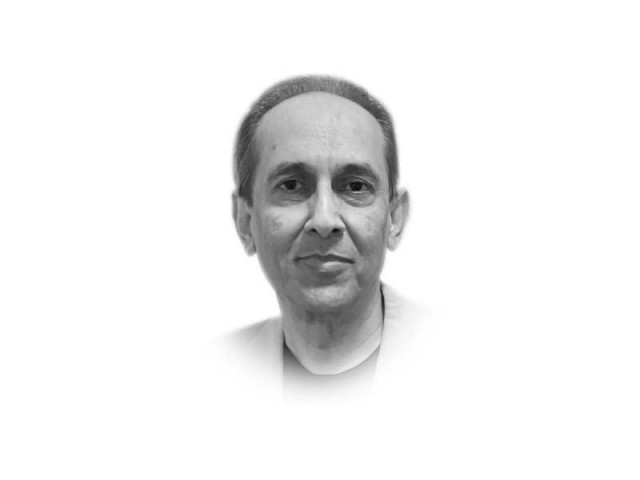Are humans emotional or rational?
Our opinions are often marred by cognitive biases

I refuse to mock Imran Khan. I refuse to admire Imran Khan. I refuse to condone everything Shehbaz Sharif government has been doing. I refuse to condemn everything Shehbaz Sharif government has been doing. I refuse to take sides especially if it follows that my side is all good and the other side is all bad. I refuse to get brainwashed. I will decide for myself who is right and who is wrong and what is good and what is bad in any given situation. I can use logic and reason to draw my own conclusions. After all, I’ve got a mind of my own. Or do I?
Let’s admit it: we humans are emotional creatures. We did not evolve to think like computers. We don’t always use logic and probability. Primal emotions like love, joy, sorrow, fear, disgust and anger are linked to our survival and our connection with the social fraternity. There are neural circuits in our brain, like the fear circuit, that get activated in response to challenges and opportunities presented by our environment (Evolution of Human Emotion, NIH). We respond to different stimuli differently. As social animals, we feel guilt, pride, envy and empathy. We also feel sexual attraction which leads to mating and procreation. We like to belong, feel relevant, and above all, feel important. We like to remain loyal to values shared by our family, friends, political party, or religion, even if those values don’t make sense.
Our opinions are often marred by cognitive biases. “We don’t always want the truth,” argues Dr Glenn Geher in Psychology Today. “We often want to convince others of our opinionated hot-take masquerading as truth in order to persuade them to join our cause. We distort the truth to make ourselves and others feel better, look better, and appear to be the godlike beings that we are not.”
Nothing stirs human emotion like the arts — literature and poetry, music, painting, sculpture, theater, architecture. We long to visit an art gallery and be swept by the works of Leonardo da Vinci and Picasso and Ismail Gulgee and Sadequain. We listen to the Requiem by Mozart and feel entranced. We raise our forefingers to the sky when we listen to Nusrat Fateh Ali. We get immersed in the writings of Shakespeare and Dostoyevsky. The serendipitous concoctions of colour created by great painters inspire us. “Colors have minds of their own,” claims Kelly Grovier in her book The Art of Colour: The History of Art in 39 Pigments. The “purple” in Vincent van Gogh’s Irises. The “red” in Vermeer’s The Girl with a Wine Glass. “The most beautiful experience we can have is the mysterious,” says Einstein. “It’s the fundamental emotion that stands at the cradle of true art and true science.”
Two weeks ago, my wife and I had a beautiful experience that was no doubt intriguing and mysterious. We watched La Boheme, the immortal opera composed by Giacomo Puccini, at the Metropolitan Opera House in New York City. The 14-story building, draped in white travertine, houses a well-appointed restaurant where we sat down for a three-course pre-theater dinner. The excitement was palpable. Men in suits and blazers. Women in pant-suits and evening gowns. The wine. The ambiance. The hushed conversations. The soft clatter of silverware. And then, we slowly slipped into the magnificent auditorium where the opera began with the twitch of a conductor’s baton. A euphonic orchestra came to life below the stage. On the stage, an unforgettable love story unfolded before our eyes. The Latin Quarter of Paris gripped in a frosty winter. A bohemian playwright meets a poor seamstress. He holds her hand: Che gelida manina (what a frozen little hand), sings the tenor. Mi chiamano Mimi (They call me Mimi), replies the soprano. The arias keep us in a magical spell over a course of four acts. Love, jealousy, joy and pain. The emotions are tangible. We smile. We laugh. We cringe. We frown. In the end, the lovely yet terminally ill seamstress succumbs to fate. Our eyes turn moist. We hold back tears as best as we can.
Oh yes, our emotions can be uplifting. However, they can also be a barrier in the path of critical thinking, a skill we developed much later in our phylogenetic history. Critical thinking skills must be honed from early childhood and taught in schools. After all, we don’t normally use logic and reason to draw conclusions. The bottom line is: above all, we are emotional creatures. And yet, inexplicably, at the heart of electoral democracy is the assumption that we are rational beings who elect our representatives using reason, logic and critical thinking. Love him or hate him, our national obsession with one man, namely Imran Khan, is evidence enough that, when it comes down to politics, rationality is nowhere to be found. It’s a fairy that lives in a fairyland beyond the edge of the world.
Published in The Express Tribune, June 5th, 2023.
Like Opinion & Editorial on Facebook, follow @ETOpEd on Twitter to receive all updates on all our daily pieces.















COMMENTS
Comments are moderated and generally will be posted if they are on-topic and not abusive.
For more information, please see our Comments FAQ